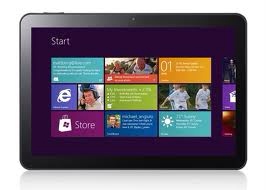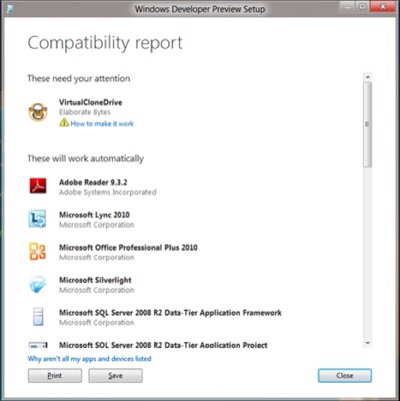Microsoft has come up with a super-clever way to let people experience Windows Phone 7.5’s unique interface for themselves: A Web-based simulation that runs on iPhones and Adnroid handsets.
Tag Archives | Microsoft
Consumers Don’t Care About Windows Tablets? No Problem
 Research firm Forrester has conducted a survey that supposedly reveals that consumer interest in Windows-based tablets–once quite high–is now tanking. Forrester is concluding that Microsoft has therefore missed the opportunity to compete strongly with the iPad, since the first serious Windows-based tablets won”t show up until sometime next year when Windows 8 ships.
Research firm Forrester has conducted a survey that supposedly reveals that consumer interest in Windows-based tablets–once quite high–is now tanking. Forrester is concluding that Microsoft has therefore missed the opportunity to compete strongly with the iPad, since the first serious Windows-based tablets won”t show up until sometime next year when Windows 8 ships.
If I were a Microsoft honcho, these results wouldn’t worry me much, for several reasons…
No comments
Office on the iPad?
Matt Hickey of The Daily is reporting that Microsoft is working on a version of Office for the iPad. His story isn’t the most compelling piece of writing and reporting I’ve ever read–he calls OS X “iOS” at one point and seems overly confident that some of his assumptions are likely true, such as the apps costing about $10 apiece.
I hope the rumor–which has existed as a bit of idle speculation for a long time–is true. It would be a smart, self-confident move on Microsoft’s part to reach out to all those iPad users rather than deny them a useful product in hopes of forcing them to buy Windows tablets. And even though there are scads of iPad productivity apps already, I haven’t found one I’d kill for: a word processor with an excellent user interface, a sophisticated word-count feature, support for hyperlinking, and built-in Dropbox capability. If Microsoft were to release a version of Word that did all that, I’d pay a lot more than ten bucks…
No comments
Microsoft Surface, and Why It Didn’t Change Everything

Jason Hiner of TechRepublic has an interesting theory: He thinks that the release of Apple’s iPhone and Microsoft’s Surface table in 2007 marks the moment that the fates of tech’s eternal archrivals diverged. Both products cleverly commercialized multi-touch input, a technology previously seen only in lab experiments and TED demos. But while the iPad and its offspring became some of the most successful gadgets of all time, (Surface clearly hasn’t lived up to expectations. I’m not sure if I’ve ever seen a Surface table in the wild.)
Surface was announced at the Wall Street Journal’s D conference in May 2007; I wrote about it at the time for Slate. But Microsoft first showed it to journalists months before at the Consumer Electronics Show in January. I was there; we had to sign an agreement stating we wouldn’t write about it until Microsoft was ready to unveil it.
No comments
Windows 8 Installation Plans Revealed
Why do people choose not to upgrade to the newest version of Windows? In plenty of cases, it’s because they don’t want to deal with the hassle of the upgrade process. In a new blog post, Microsoft has outlined its plans for how upgrades to Windows 8 will work. They’re ambitious, involving a Web-based system that checks a PC and its apps for Windows 8 compatibility and can either install the new OS on the fly or create a DVD or thumb drive-based install.
It’s not going to lure everyone who’s reluctant to upgrade–for one thing, you’ll only be able to perform a full upgrade, with existing apps remaining in place, on Windows 7 machines. But if it works as planned, it sounds nifty, and should be a good starting point for versions of Windows beyond 8.
No comments
Microsoft Office vs. Google Apps: Ugly!
At AllBusiness.com, I blogged about the ongoing war between Office and Google Apps–as seen in recent Microsoft blog posts and this week’s Google Atmosphere conference–and why I’m not taking sides.
No comments
Weekend Nostalgia: Bill Gates Unveils Windows 3.1
At the Windows World conference in 1991, an alarmingly youthful Bill Gates recaps the history of DOS and Windows to date and previews Windows 3.1:
[gigya src=”http://www.youtube.com/p/33DD92A1265639E8?hl=en_US&fs=1″ type=”application/x-shockwave-flash” width=”545″ height=”437″ allowscriptaccess=”always” allowfullscreen=”true” ]
No comments
Flash’s Fate: Blame Microsoft, Not Apple
Commenter Ridd make a good point about Flash over at this story by Erica Ogg on why mobile Flash failed:
The real reason why Adobe is dropping Flash mobile support is not iPhone. It is Windows 8.
Microsoft made it very clear that they won’t allow Flash to run in Windows 8 Metro browser and they are pushing HTML5 as a platform. You do not need a crystal ball to see that without Windows’ (which runs on 95% of PCs worldwide) support, Flash is dead. It will be supported for legacy reasons for a while, but it has no future.
Windows 8 isn’t a mobile operating system–it’s an OS that aims to run well on both mobile devices and garden-variety, traditional computers. If its browser doesn’t support Flash–or any plug-in, how much longer will Flash in any form live on?
No comments
ViewSonic Tablet Runs Windows and Android: Good Idea, Poor Execution

As a holdover until Microsoft ships the tablet-friendly Windows 8, I like the idea of a Windows 7 tablet that also runs Android. Sure, Windows 7 doesn’t play nicely with touch screens, but it’s a great operating system for getting work done, and when you’re finished, you can switch to Android for leisure.
That’s what ViewSonic tries to accomplish with its ViewPad 10pro tablet. The 10-inch slab runs Windows 7, and also includes an Android emulator on the desktop, letting you run proper tablet apps without restarting the machine. (A previous ViewSonic tablet, the ViewPad 10, dual-booted Windows and Android, requiring a restart to switch between them.)
It’s a neat idea in theory. But in practice, the ViewSonic 10pro only proves that some ideas are better left unrealized.
No comments
How Courier Died, Part II
Here’s the second half of Jay Greene’s story on Microsoft’s two-screen Courier tablet, and why it never saw the light of day except as a spellbinding concept video.

